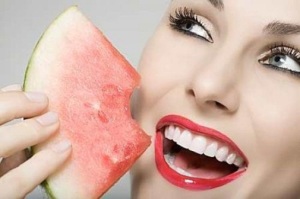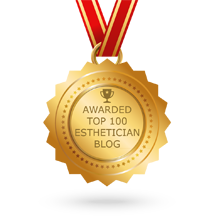I’ve been a vegetarian for over 20 years, and have no plans to start eating meat any time soon, so could that mean I am hurting my skin instead of helping it? Truthfully I didn’t think that the lack of animal protein in my diet was hurting my skin at all until I read the following post from esthetician Renee Rouleau on her blog:
From working with skin hands-on as an esthetician and skin care expert for over twenty years, I have to say that I most definitely have seen similarities in the skin of people who have a vegan diet versus those who are not. What I have noticed is a dull, tired, sallow look to the skin, similar to that of a heavy smoker’s skin, as well as a premature loss of skin tone. By no means am I knocking someone’s choice to live a vegan lifestyle, I’m simply sharing my observations and thoughts.
Because a vegan diet consists of mainly fruits, vegetables, beans, nuts and whole grains, those that follow it may have trouble getting enough protein—the building blocks for skin. Protein is an essential component that makes up cells in the epidermis, including collagen and elastin fibers to keep skin firm and smooth.
Many vegans rely on beans and soy as their main source of protein, but protein that comes from fish, poultry and meat may be more complete and therefore make for a better effect for the appearance…
Now I am not going to argue with Rouleau’s hands on experience and observations about how people’s skin who follow a vegan diet looks because of her experience and expertise (and on a side note, the more I read of Rouleau’s blog the more I like her and her advice, usually), but I can go by my experience being a vegetarian for a long time and I certainly can research this topic – which I did. Though Rouleau mentions specifically an issue with vegan’s skin, vegan’s do not eat any animal protein or any food derived from animal sources like eggs, dairy, or honey, I chose to tackle this question by looking at both a vegetarian (a vegetarian will eat dairy, honey, and eggs) and vegan diets as well.
I found it really interesting that a lack of animal protein in someone’s diet would influence how their skin looks since you can get enough protein in your diet from dairy, eggs, and legumes (not to mention certain grains as well like quinoa). Making a statement that a person needs animal protein in their diet for good skin – is that just an anti-vegetarian or vegan bias? I have to admit that the minute I read Rouleau’s post I got a little defensive about my vegetarian diet and how my skin looks, and I really wanted to research this topic further.
Yes, Protein Is Important But You Don’t Need Meat
A well balanced diet is key to both having and maintaining great skin, but a well balanced diet means that you eat a wide variety of foods from many sources not just animal sources. I looked through my various books at home and searched online in order to see if others agreed with Rouleau’s statement that consuming animal protein was necessary for building collagen. I only found one other source that said the same thing. Mostly my research yielded the similar lists of foods that promote great skin and good health like a wide variety of fruits and vegetables, nuts, olive oil, lean protein like fish, poultry, tofu, and legumes, and whole grains. When it comes to building collagen in the skin, in particular, New Beauty suggests eating the following foods:
Boost your body’s collagen with the following eight foods:
1. Water-rich vegetables like cucumber and celery have a high sulfur content, which is important in collagen production. Collagen can’t be produced if sulfur isn’t present.
2. Fish creates stronger cells. Fish is loaded with omega-3 fatty acids. Skin cells are surrounded by a fatty membrane that protects them. When the cells are healthy, they are able to support the structure of the skin.
3. Soy blocks aging. Whether sourced from soymilk, cheese or tofu, soy contains genistein (plant hormones that serve as antioxidants), which prompts collagen production and helps to block enzymes, like MMPs, that can age the skin.
4. Red vegetables are a natural form of SPF. Tomatoes, peppers and beets contain the antioxidant lycopene. Lycopene protects the skin from damage while increasing collagen levels, acting as a natural sun block.
5. Dark green vegetables, rich in vitamin C, like spinach and kale, rev up collagen production. In topical products, vitamin C stabilizes messenger enzymes that break down collagen. It also prevents weak collagen by protecting against free radicals.
6. Berries ward off damage. Blackberries and raspberries scavenge free radicals while simultaneously increasing collagen levels.
7. White tea supports structure. According to research conducted by Kingston University and Neal’s Yard Remedies, white tea may protect the structural proteins of the skin, specifically collagen. It’s believed to prevent enzyme activity that breaks down collagen, contributing to lines and wrinkles.
8. Orange vegetables, like carrots and sweet potatoes, are rich in vitamin A, which restores and regenerates damaged collagen
So while an animal protein does show up on this list there are plenty of other options as well for building collagen. Dermatologist Nicole Rogers, MD, on WebMD, answers the question about what to eat in order to prevent wrinkles thusly:
Question:
What kind of foods should I include in my diet to prevent wrinkles?
Answer:
It’s helpful to ingest foods that are high in antioxidants. These foods can help absorb the free radicals created in your body by UV light exposure, which can break down collagen and create fine lines and wrinkles. Foods high in antioxidants include dark berries such as blueberries, cranberries, blackberries, and raspberries. Beans are also high in antioxidants, including red beans, kidney beans, and pinto beans. Also, drinks that may be helpful include green tea, red wine, and coffee, all in moderation of course.
No mention here either of having to eat animal protein.
I also turned to Dr. Carl Thornfeldt in his book The New Ideal in Skin Health to see what he had to say about diet and aging (pages 445-446):
It is well known that a poor diet contributes to exacerbation and severity of skin lesions, preventing proper healing and reducing remission time. The blame has been directed at many different types of food, and while many of those claims are not valid, a healthy and balanced diet certainly can make a huge impact to one’s skin. Beginning in elementary school, Americans are taught to eat according to the FDA four food groups that has been upgraded to become the Food Pyramid. However, most people do not actually follow those guidelines. To help with overall skin health, the reduction of sugar consumption is critical and should be the first step. Incorporating at least one additional serving of preferably fresh fruits and vegetables a day is also an effective way to improve overall health that corresponds directly to the health of one’s skin.
Furthermore, Dr. Thornfeldt points out that there is an ingredient that is widely and universally consumed that is ruining our health (and aging us by causing inflammation):
Refined White Sugar is Nutritional Public Enemy #1
The least popular recommendation I make is to avoid refined sugar. When raw sugar – from sources such as sugar cane or sugar beet – is bleached so that only the pure sucrose is left, it is called “refined sugar.” Refined sugar is what you would buy in the store as white sugar. Refined white sugar is nutritional health public enemy #1 because it activates the glycation inflammatory pathway and stimulates excess insulin production by its high glycemic index, which is the speed of raising blood glucose levels, inducing an insulin spike. This leads to further destructive inflammation. Corn syrup contains fructose, which consists of a glucose and galactose. Galactose has a lower glycemic index with slower absorption. Brown sugar, molasses and honey all contain more complex sugars and proteins, thus improving the relative nutritional value as well as reducing the glycemic index. (page 450)
In my opinion, and from the reading that I have done, I would call out sugar as a bigger collagen destroyer than not eating animal protein. I struggle with my own addiction to sugar and keep trying to cut down on my sugar consumption in order to preserve my skin. It’s hard.
Bottom Line: in order to keep your skin looking youthful limit your refined sugar consumption and eat a balanced diet filled with lots of fruits and vegetables, lean proteins (from any source), and whole grains.
Further Reading:
- The Mind-Beauty Connection by Amy Wechsler, MD – Chapter 7: The Beauty Buffet and Bar. I love this book and find that this chapter does a great job at explaining concretely how a healthy diet impacts your skin and overall health.
- Feed Your Face by Jessica Wu, MD – Chapter 7: Stop Wrinkles Before They Start. Another great resource for information about what to eat to have great skin.
- 6 Foods to Eat Every Day for Great Skin – Daily Beauty
- How to Stop Your Skin From Sagging – Daily Beauty
- Fruits and Veggies Are Good for You—But for Your Skin Tone?! – Allure
- How the Beauty Diet Can Enhance Your Looks – Prevention
- The Healthy Skin Diet – Skin Inc.
My Related Posts:
Image from www.ithappensinindia.com



[…] What is the difference between a vegan and vegetarianHealthy Food To EatWork Wellness Programs IdeasDownload: Vegetarian Weight Loss Diet Information: Vegetarian DietsIs A Vegetarian Or Vegan Diet Bad For Your Skin […]
[…] Is A Vegetarian Or Vegan Diet Bad For Your Skin … – Apr 12, 2012 · April 16, 2012 at 7:44 pm […] What is the difference between a vegan and vegetarianHealthy Food To EatWork Wellness Programs IdeasDownload: Vegetarian …… […]
I would like to know more about these vegans with “a dull, tired, sallow look to the skin, similar to that of a heavy smoker’s skin.” How long have they been vegan? Do they, or did they ever smoke? How much water do they drink? How much alcohol do they drink? How much time do they spend in the sun? Changes don’t happen overnight. You can eat all the right foods, but you need to take care of your skin in other ways, too! I like how this article breaks down how different plant-based foods are beneficial to the skin.